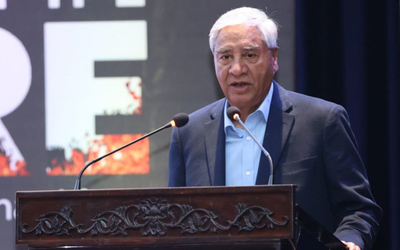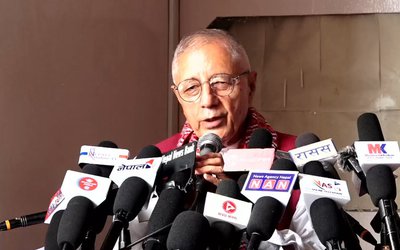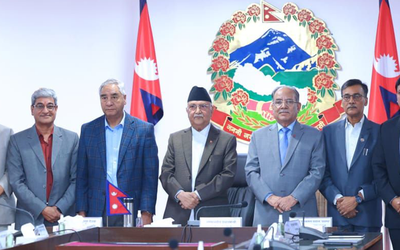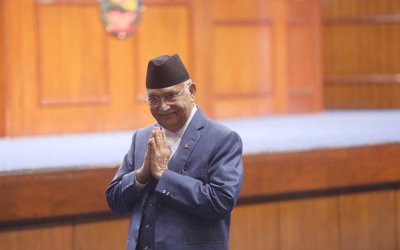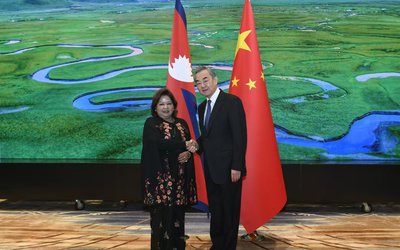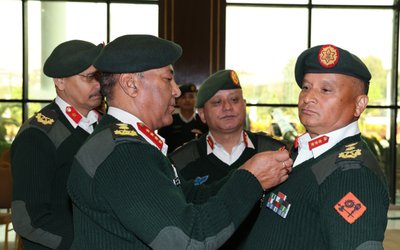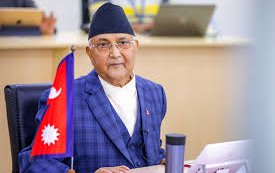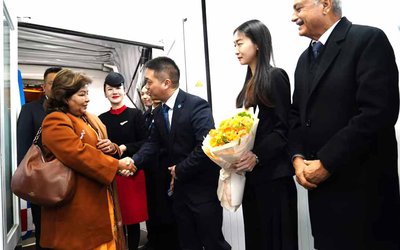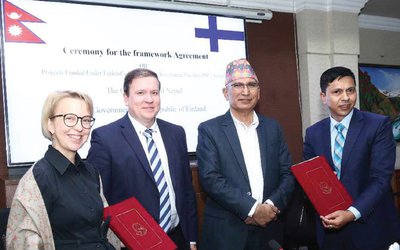
Prime Minister K.P. Sharma Oli's four years long posture as a true defender of Nepal's ultra nationalism has come to the heel following his agreement with separatist leader C.K Raut.
Suddenly but in a planned manner Prime Minister Oli, in the presence of NCP leader Pushpa Kamal Dahal, signed an agreement with Raut, separatist leader from Madhesh, to join mainstream politics giving up his seven years long demand for independent Madhesh.
After signing the agreement, Coordinator of Alliance for Independent Madhes CK Raut withdrew his demand for a separate state.
The ‘free Madhes’ campaigner signed the pact with Home Minister Ram Bahadur Thapa acknowledging Nepal as a free and sovereign nation which cannot be divided and promised to completely halt dissemination of secessionist information. Prime Minister KP Sharma Oli was also present on the occasion. Former prime minister Dr. Baburam Bhattarai in his tweet criticized Oli’s move to hastily sign the deal.
Even before any statement from main opposition party Nepali Congress, NCP leader Bhim Rawal issued a statement questioning the nationalist credential of his leader and Prime Minister Oli on the 11-point agreement.
Raising the question on Clause 2, which says they will follow a democratic means to address the dissatisfaction of people, including those of Tarai-Madhes, NCP leader condemned the agreement saying that the clause gave legitimacy to secessionist movement or separate homeland in Nepal.
Four years ago, PM Oli was made a hero and guarantor of Nepal's sovereignty for his sentimental decision to defy suggestions of Indian Prime Minister Narendra Modi to make the constitution inclusive.
Nepali nationalist people ignored Indian PM Modi’s strong statement against ethnic based slogans raised in all parts of Nepal to support PM Oli. After the new eleven point agreement, the table has turned against PM Oli.
Social media, including Facebook and Twitter, were full of words condemning Oli for his stand on backing secessionist CK Raut and surrendering before him. The sentiment against PM Oli went widespread after Raut delivered statements in Janakpurdham and his cadres' slogans taking the agreement as a document of endorsement of secessionist movement.
The statements and activities of CK Raut and his worker even irked the province 2 government and chief minister Mohammad Lalbabu Raut, who issued a statement opposing the secessionist move of CK Raut. The Chief Minister demanded a clear statement from PM Oli on the issue of Nepal's integrity and independence.
PM Oli, who championed the anti-Madhesh slogan in 2015 terming the protestors anti-national, is now in a court to prove his nationalistic credential to very people who termed them anti-national.
As the criticism on his role in signing the agreement with CK Raut intensifies, the Prime Minister and his coterie are trying to sell the agreement as that of the 12-point agreement.
"This is an historic agreement after the 12-points agreement. We are able to bring separatist leader CK Raut forcing him to join peaceful politics within the constitution," said General Secretary of NCP Bishnu Poudel. "The agreement did not recognize any separatist movement. The agreement has disagreed on separatist movement."
Even Dr. Baburam Bhattarai expressed the dissatisfaction over the use of words in the agreement. "PM Oli termed me joining hand with separatist simply for my meeting with CK Raut," said Dr. Bhattarai.
As anti-Oli wave is growing, nobody wants to listen to what the agreement actually says. Even the good spirit and suggestion of Sukh Deo Muni, a renowned scholar and Nepal expert of India, is interpreted differently.
"Dr CK Raut and Nepal government led by Oli must be complimented for the agreement to mainstream ‘Free Madhes’ movement. There is enough democratic space to fight for the interests of Madhes in Nepal,” tweets Sukh Deo Muni.
After reading angry reactions, Professor Muni retweeted, "What should one do with such Nepali friends who understand my tweet in their own way. I welcomed Raut’s withdrawal of separatist Madhes demand and Oli Govt. giving freedom to him to play his politics within Nepal’s democratic order. What is wrong with that?"
Following the sentimental words and statements after promulgation of Constitution of Nepal, which has been creating so many complexities and crises due to ambiguity and flaws in words, Oli was made a hero even for his wrong position and stand.
In a matter of just four years, people have dumped the same hero and icon of Nepali nationalism K.P. Sharma Oli as a villain. In social media, there are waves of statement against PM Oli's stand terming it anti-national.
As there is a growing anger against PM Oli, Nepal Students Union, a student wing of Nepali Congress, burnt the effigy of PM Oli terming him a separatist leader. "PM Oli agreed to fabricate our country agreeing to the demand of Separatist leader," said a Nepal Students Union leader.
Long before the promulgation of present constitution, Nepal's well wishers had visualized the possibility of the recent political crisis and chaos. However, Nepali Congress leadership, CPN-UML leader and Maoist leader defied and ignored good suggestions of internal and external friends, including Nepal's southern neighbor, covering their mistakes and wrongdoings with the nationalist slogans. PM Oli even was able to mobilise Nepali diaspora for his sentimental slogan.
Despite opposing the agreement, Nepali Congress leadership is still with Prime Minister Oli in implementing the constitution, which seems to be responsible for the present chaos.
Although people in social media and street are gradually realizing that those who control the state power, chanting nationalist slogan and blaming particular country, fooled them, they don't have the power to reverse the present state. The time has come to say right and wrong on the basis of fact not on the basis of sentiment.
Eleven Points Agreement
- CK Raut and his party, Alliance for Independent Madhes, will respect the sovereignty and territorial integrity of the country
- They will follow democratic means to address dissatisfactions of people, including those of Tarai-Madhes
- They have agreed to settle all differences through democratic means
- They expressed their commitment to ensure autonomy and equality
- The government agreed to withdraw all cases slapped against AIM cadres and all AIM cadres and leaders will be released from jail/custody without any condition
- AIM leaders will not be prosecuted for publicity materials produced in the past, but it was agreed the party wouldn’t publish any such material in future
- AIM cadres and leaders can enjoy all rights guaranteed by the constitution, including the right to open political parties
- The family of Ram Manohar Yadav, AIM cadre who died in jail, will be provided with adequate compensation and one member of the family will be provided with a government job
- Government will provide treatment to all AIM cadres who were injured during the movement
- The government agreed to treat AIM as a democratic political force
- The agreement came into force on Friday
- PM Oli's Visit To China: Geopolitical Implications
- Nov 19, 2024
- NEA: Kul Man Ghising, A Cool Man
- Oct 28, 2024
- DASHAIN FESTIVAL : Festival of Unity
- Oct 04, 2024
- NEPAL-CANADA Bilateral Meeting
- Oct 04, 2024
- MIDDLE BHOTEKOSHI: Final Stage
- Sep 23, 2024



